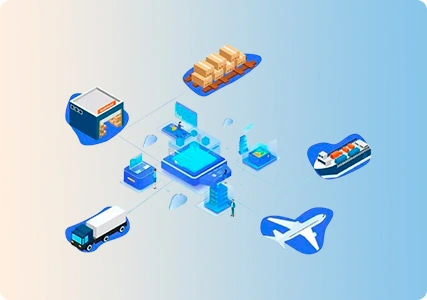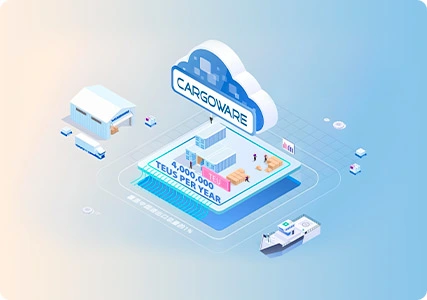Cross-border logistics management solutions overview
As international trade grows, cross-border e-commerce is emerging at a rapid pace. As various forms of uncertainty and supply chain congestion continue to disrupt trade flows in 2021, the specialist logistics skills and infrastructure required to manage cross-border parcel shipments continue to be tested as never before.
These disruptions and logistics service providers experienced by many shippers are extremely challenging - but they also provide some valuable insights into improving the efficiency of cross-border logistics operations
-Get cross-border logistics management solutions
Cross-border e-commerce can refer to online trade between a business (retailer or brand) and a consumer (B2C), between two businesses (usually a brand or wholesaler) (B2B) or between two private individuals (C2C), for example through such marketplaces as Amazon or eBay.
What are the risks associated with cross-border e-commerce
There are 3 main risks affecting cross-border e-commerce.
Fraud is arguably the biggest challenge facing merchants who allow their customers to buy from them outside their country. It is therefore vital to choose a quality payment service that understands local customer behavior.
Logistics and reverse logistics are equally important and can have a negative impact on how your business is perceived by local customers. Consistent and predictable logistics is a requirement for businesses wanting to take advantage of cross-border e-commerce.
Regulations - local governments and taxes need to be thoroughly reviewed and may have a negative impact on your business.
eTower Cross-border logistics management solutions help you to integrate the logistics of individual orders, reduce the impact of cross-border e-commerce logistics process efficiency issues on your business, and last-mile logistics business processes, helping you to streamline operational efficiency in your business and minimize operational costs.
At the same time, our cross-border logistics management solutions of credit and risk control, financial management and internal staff account allocation can help your cross-border e-commerce business to run smoothly.
Cross-border e-commerce logistics characteristics
Agility and flexibility: Agility and flexibility are crucial attributes. Many variations of the self-service freight network are amplified at border crossings. Flexibility also means mix-and-match logistics options. Just as cross-border logistics need to be flexible, so too does the choice of logistics services required to support cross-border shipments. Some shippers need a complete logistics management process and system.
eTower provides cross-border logistics management solutions to help you do this; we combine cutting-edge technology with our extensive experience in the cross-border logistics industry to facilitate the digital transformation and upgrade of international 3pl, 4pl logistics companies. Effectively improve the efficiency of their business operations and minimize their operational costs.
Keeping a close eye on logistics visibility: In cross-border logistics operations, there are many touch points to navigate - from operating terminal warehouses and long-haul carriers to brokers and freight forwarders/tail-haul dispatchers - and logistics service providers cannot afford to fly blind at any stage of the process.
eTower cross-border logistics management solution achieves this level of visibility with its visibility platform and control tower technology, which provides network-wide visibility for cross-border logistics.
Markets of opportunity for cross-border e-commerce
China - Cross-border e-commerce in China is worth US$60 billion, but legislation could have an impact on it. The reason for potential government intervention is that brands are using cross-border e-commerce to circumvent regulation of their products by local agencies. The burgeoning backdoor channel known as cross-border e-commerce allows Chinese consumers to buy goods made overseas online and effectively circumvent the regulatory issues that hinder consumer products from cosmetics to cognac. Faced with pressure from traditional domestic retailers and the loss of tax revenue, the government is now considering fixing legal loopholes.
South East Asia - Singapore, Indonesia. The report states that the e-commerce market in Southeast Asia will reach US$20B by 2025, with online sales growing at a CAGR of 32%. With 600 million consumers and 260 million people online, China is the world's largest market for internet users. It, therefore, makes perfect sense that both Amazon and Alibaba have increased their interest in this sector.
AUSTRALIA - Australians like to buy their clothes from online shops outside of China. Since March 2016, Chinese authorities have issued a series of regulations aimed at expanding normal import duties and regulatory requirements for goods imported into China through cross-border e-commerce channels. The new regime caused a strong reaction among cross-border e-commerce sellers at home and abroad and was put on indefinite hold days before Premier Li's visit to Australia and New Zealand in March 2017. Imports into China via cross-border e-commerce can continue to benefit from low tariffs and regulatory exemptions.
France - The fastest growing e-commerce segment in France is cross-border shopping. Almost half of the French consumers regularly buy from cross-border merchants and 19% of all online sales in 2016 were made on non-domestic websites, 4 percentage points higher than the European average of 15%, most commonly in Germany, the UK, Belgium, the US, and China. The main problem for French customers is their relatively small transaction volume compared to the countries mentioned earlier.
Mexico - is a long-term market because the e-commerce market is growing at an impressive rate (21%). Security concerns about payments are hampering growth. Amazon has worked with local retailers to ensure that customers can pay for purchases with cash. Competition in the market is low, and with increased growth rates, Mexico could become the most important market in e-commerce in Latin America in the long term.
Faced with such a large cross-border e-commerce market, supporting Cross-border logistics management solutions need to keep up with the development trend of e-commerce. If you also want to efficiently realize cross-border logistics services,eTower is the quality choice for you.
eTower enables cross-border logistics service providers to go live quickly and facilitates the digital transformation of cross-border logistics enterprises. Not only does it reduce costs and improve efficiency for logistics companies, it also helps them to provide better services to sellers and achieve one-stop collaboration in one system - eTower a cross-border logistics management solution.










